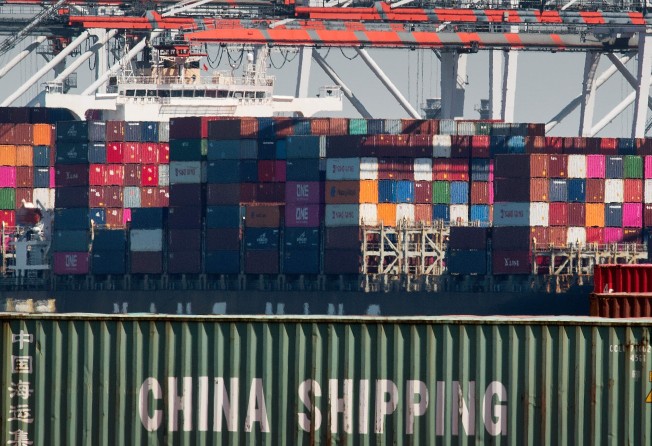China’s 2019 growth rate again cut by IMF as US trade war, Brexit leaves world economy in ‘precarious’ position
- Washington-based International Monetary Fund (IMF) predict in their latest report that China’s growth will be 6.1 per cent in 2019 and 5.8 per cent in 2020
- Chief economist Gita Gopinath says there is an ‘urgent need’ to de-escalate trade and geopolitical tensions as IMF also cuts 2019 global growth forecast to 3 per cent

China’s economic growth rate will remain just inside the government's target range in 2019 despite the International Monetary Fund again downgrading their prediction, while warning the outlook for the world economy “remains precarious.”
The Washington-based International Monetary Fund (IMF) predicted in their latest report released on Tuesday that China’s growth will be 6.1 per cent in 2019 and 5.8 per cent in 2020.
Beijing has set a target range of between 6 to 6.5 per cent for 2019 with the mainland economy still weighed down by tariffs from the United States as well as sluggish domestic demand.
The IMF also cut its global economic growth forecast for 2019 to 3 per cent, which would be the slowest rate since the global financial crisis a decade ago. It is the fifth consecutive occasion that the IMF has downgraded their prediction for the global economy amid the US-China trade war as well as others factor including Britain’s protracted exit from the European Union having published a forecast of 3.9 per cent in July 2018.
“Downside risks to the outlook are elevated,” said IMF chief economist Gita Gopinath. “Trade barriers and heightened geopolitical tensions, including Brexit-related risks, could further disrupt supply chains and hamper confidence, investment, and growth.
“With a synchronised slowdown and uncertain recovery, the global outlook remains precarious. At 3 per cent growth, there is no room for policy mistakes and an urgent need for policymakers to cooperatively de-escalate trade and geopolitical tensions.”
Having cut 0.2 percentage point from their previous prediction for the 2019 global economy in July, the IMF also downgraded its 2020 forecast to 3.4 per cent, down 0.1 percentage points.
Tariffs from the trade war between the US and China will cut global growth by 0.8 percentage points next year, according to the IMF. It also estimated that the average US tariff on imports from China will increase to just over 24 per cent by December, while the average Chinese tariff on American imports will rise to around 26 per cent.
Lower interest rates adopted in some countries have helped boost the predictions for this year and 2020 by 0.5 percentage points, although the IMF expressed a concern that the world economy is relying too heavily on monetary policy to support growth.
“Monetary policy cannot be the only game in town and should be coupled with fiscal support where fiscal space is available and where policy is not already too expansionary,” added Gopinath, who singled out Germany as having room to use current negative interest rates to boost investment.
The report is the first issued under new managing director Kristalina Georgieva after the Bulgarian was appointed at the start of October.
China is likely to suffer most from the trade war with the US, with its output falling 2 per cent in the short term and 1 per cent in the long term, the IMF projected. The US will also suffer with its output falling by 0.6 per cent in both the short term and long term.
US growth is projected to be 2.4 per cent in 2019 and 2.1 per cent in 2020, with growth for the world’s largest economy likely to be lifted by the two-year budget deal signed into law by US President Donald Trump in August as well as the US Federal Reserve’s policy rate cuts.
Some of biggest growth downgrades were for advanced economies in Asia, including Hong Kong, South Korea and Singapore, due to their exposure to slowing growth in China as well as spillovers from the trade war with the US, the IMF said.
The IMF also warned that persistent weakness in manufacturing and global trade spread into the services sector, which has so far remained resilient to trade tensions and slow growth.
A tentative US-China trade deal agreed last week has temporarily suspended fresh tariffs that were set to come into force on Tuesday.
US Treasury Secretary Steven Mnuchin, though, warned on Monday that new tariffs on US$156 billion of Chinese goods are still likely be imposed on December 15. This is unless Trump and Chinese president Xi Jinping can finalise a deal at their anticipated meeting at the Asia-Pacific Economic Cooperation summit meeting in Chile in mid-November.